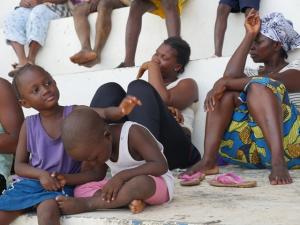Sierra Leone health sector better prepared against seasonal flooding
Flooding from torrential rainfall is the most common form of natural disaster in Sierra Leone and regularly causes significant damage and harms people's health, especially in poor communities and settlements. A new national flood emergency and response plan is now under development to help ensure the country is better prepared to prevent and manage floods.
Between July and September of every year, localised flooding from the seasonal rains affects hundreds of families in different parts of the country often with serious health and socioeconomic consequences. People living in slums and poor communities always suffer the most.
In September 2015, an estimated 18,000 people mainly from flood-prone slum communities in Freetown were made homeless due to the heavy rains, resulting in a massive humanitarian crisis: Dwelling structures were washed away, property destroyed, families displaced and the livelihoods of the affected communities interrupted. Other parts of the country were similarly affected.
Though the events triggered an immediate humanitarian response to mitigate the impact of the crisis, it was evident that there was inadequate preparedness prior to the incident. The response therefore encountered a number of challenges in the provision of adequate temporary shelter for the affected families, health care services, water, sanitation and hygiene facilities.
The lessons from the 2015 flooding set in motion the development of a flood emergency preparedness and response plan by the government with technical support from the United Nations and other partners.
The plan aims to ensure that the Ministry of Health and Sanitation and other ministries anticipate, prevent and prepare for potential health and related hazards in case of flooding. It proposes activities and provides guidance on roles, responsibilities and procedures that would be necessary to facilitate prompt action in the event of flooding that could impact on the health, safety and wellbeing of the public. It also aims to ensure continuity in the availability of essential health care services and optimal medical commodities to minimize challenges during and after any flooding incident
As part of the early warning system and preparedness plan, flood prone communities have also been mapped out and sensitizations to raise awareness on the potential for flooding in those communities are underway. Meanwhile, WHO is supporting the Ministry to procure and preposition Diarrhoea Disease Kits as well as laboratory supplies that can be used in event of diarrhoea outbreaks in the country, which can be a consequence of flooding incidents.
WHO is providing strong technical support in the development of the plan and prepositioning essential supplies for prompt response in the event of any such disaster. It is also coordinating the support of other UN agencies and International Organisations under the intergancy multihazard plan for predictable, well-organized and timely support in the event of serious flooding for the future.



